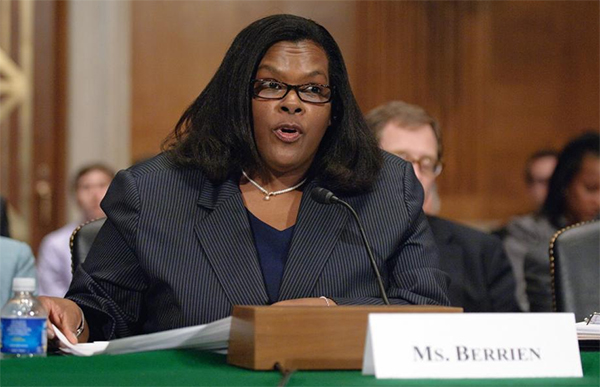NEWSLETTER
|
Jacqueline Berrien: Fighter for “a Fair Chance”
Ms. Berrien, 53, became ill in August during the National Association for the Advancement of Colored People’s Journey for Justice, an 850-mile march from Selma, Ala., to Washington, D.C., that was meant to “highlight vulnerable communities subject to regressive voting rights tactics.”
“Her last act was doing what she loved: civil rights,” said her husband, Peter M. Williams, executive vice president for programs at the NAACP.
Funeral services are scheduled this Saturday morning, November 21, at the Michigan Park Christian Church at 1600 Taylor Street, N.E., in Washington D.C. Viewing will be at 10 and the service will be at 11.
A memorial service is planned for 11 Saturday morning, December 5, in Brooklyn, N.Y., at the Emanuel Baptist Church at 279 Lafayette Avenue.
“Jackie’s leadership and passion for ensuring everyone gets a fair chance to succeed in the workplace has changed our country for the better,” said President Barack Obama, who appointed her to the EEOC and where she served as chair from April 2010 through August 2014.
“….she fought hard every day to make real our nation’s promise of equal opportunity for all. She injected new life into the EEOC with new ideas and strategies that helped refocus the commission on its enduring mission—protecting the most fundamental rights of all Americans.”
During her tenure at the EEOC the commission reduced its caseload of unresolved discrimination charges for the first time in a decade, thereby recovering millions of dollars in relief for victims of unlawful employment discrimination.
The EEOC also issued rules against discrimination in employment and health-insurance enrollment on the basis of disability or genetic test results, and won a record $240 million jury verdict against a company accused of abusing workers with intellectual disabilities at its turkey processing plant in Iowa. The verdict, however, subsequently was reduced to $1.6 million because of a statutory cap on damages.
A friend, Melanie Eversley, said that “Jackie believed in helping the underdog. She always talked about how the real movers of the civil rights movement were unsung residents of small towns in the South who risked lives and jobs to march and defy the status quo.”
She was born in Washington and graduated from Oberlin College with a bachelor’s degree with high honors in government, and also completed a major in English. As a junior she received the college’s Harry S. Truman Scholarship for her leadership potential and commitment to a career in public service.
Ms. Berrien then enrolled in the Harvard University Law School where she served as general editor of The Harvard Civil Rights-Civil Liberties Law Review.
After receiving her law degree in 1986 she went to work as a clerk for Judge U.W. Clemon, the first African-American United States District Court Judge in Alabama.
She then went to work for the Lawyers’ Committee for Civil Rights and then the Women’s Rights Project of the American Civil Liberties Union (ACLU). In 1994 she became an assistant counsel to the NAACP Legal Defense Fund, focusing on voting rights and school desegregation litigation. She left to work at Ford and then returned to the fund as its associate director-counsel.
While at Ford, from 2001 to 2004, she administered more than $13 million in grants designed primarily to foster political participation by underrepresented groups.
“I am confident,” Ms. Berrien said when she was approved as EEOC chairman, “that I am here because many people who lived before I was born were determined that I should have opportunities that they could only witness in dreams and articulate in prayers.
“I am motivated by the knowledge that the entire nation will benefit as we move closer to fulfilling the mission that guides the EEOC: to end unlawful discrimination in the nation’s workplaces.”
Soon after becoming EEOC’s chair, in an interview with The Washington Post, she foresaw a long struggle. “The essence of the work of advancing and protecting civil rights in this country,” she said, “is very much something where our ultimate success will manifest in decades…measured by how different life is for someone who is a child today.”
|


